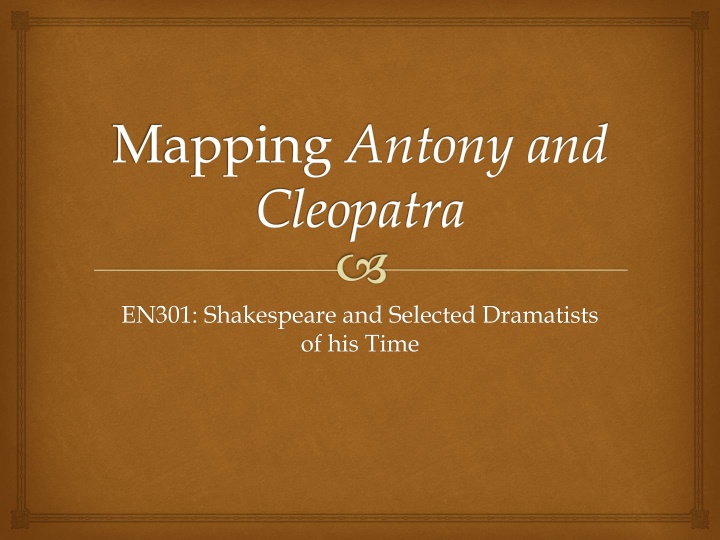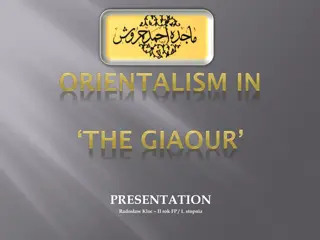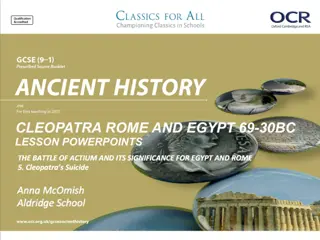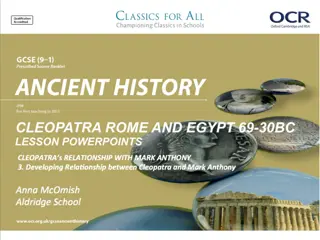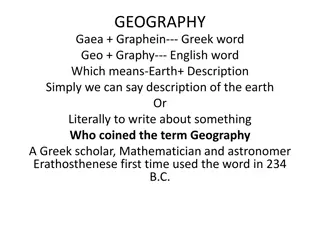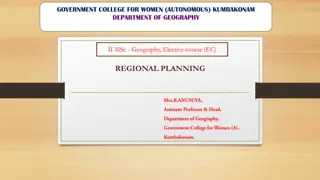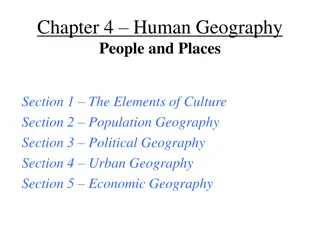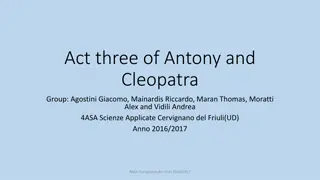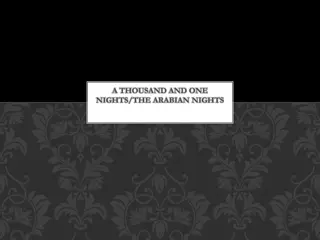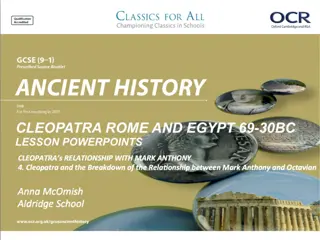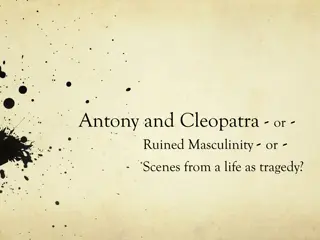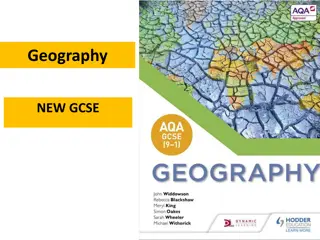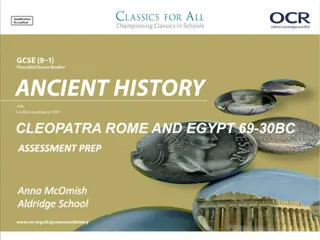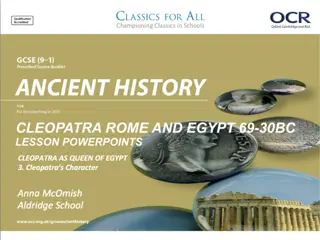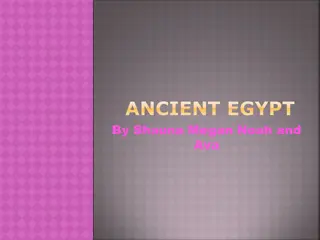Exploration of Geography and Orientalism in Antony and Cleopatra
The play "Antony and Cleopatra" by Shakespeare delves into the contrasting worlds of Egypt and Rome, highlighting the geographical and cultural distinctions. Antony's internal conflict between Rome and Egypt showcases the allure and temptation of the East. Additionally, the theme of Orientalism, as defined by Edward Said, is depicted through Antony's symbolic gestures towards Cleopatra. These aspects add depth to the narrative, exploring themes of power, desire, and dominance in the context of different cultures.
Download Presentation

Please find below an Image/Link to download the presentation.
The content on the website is provided AS IS for your information and personal use only. It may not be sold, licensed, or shared on other websites without obtaining consent from the author.If you encounter any issues during the download, it is possible that the publisher has removed the file from their server.
You are allowed to download the files provided on this website for personal or commercial use, subject to the condition that they are used lawfully. All files are the property of their respective owners.
The content on the website is provided AS IS for your information and personal use only. It may not be sold, licensed, or shared on other websites without obtaining consent from the author.
E N D
Presentation Transcript
Mapping Antony and Cleopatra EN301: Shakespeare and Selected Dramatists of his Time
1.4, 2.2, 2.3, 2.4, 1.4, 2.2, 2.3, 2.4, 1.4, 2.2, 2.3, 3.2 3.2, 3.6 1.4 2.4 3.4, 3.5 3.1 2.6, 2.7 3.7, 3.8, 3.9, 3.10 3.12, 4.1, 3.12, 4.1, 3.12, 4.1, 4.6, 2.1 4.7, 4.8, 4.9, 4.11, 3.12 3.12, 4.1 4.6 4.6, 4.10 4.10, 5.1 4.7, 4.8, 4.9 4.12, 4.13 1.1, 1.2, 1.3, 1.5, 2.5, 1.1, 1.2, 1.3, 1.5, 2.5, 1.1, 1.2, 1.3, 1.5, 2.5, 1.1, 1.2, 1.3, 1.5, 2.5, 1.1, 1.2, 1.3, 1.5, 2.5, 1.1, 1.2, 1.3, 1.5, 2.5, 3.3, 3.11, 3.13, 4.2, 4.3, 3.3, 3.11, 3.13, 4.2, 4.3, 3.3, 3.11, 3.13, 4.2, 4.3, 4.5 1.1, 1.2, 1.3 1.1, 1.2, 1.3, 1.5 1.1, 1.2, 1.3, 1.5, 2.5 3.3 3.3, 3.11 3.3, 3.11, 3.13 4.4 4.4, 4.14, 4.15, 4.16 4.4, 4.14, 4.15, 4.16, 5.2 Source: McCarter Theater, Princeton University, http://www.mccarter.org
Source: Pamela Bradley, The Ancient World Transformed (C. U. P., 2014), p. 366
Geography The word world is used 45 times in this play. Act 1 sets up a clear binary between Egypt and Rome: MESSENGER. News, my good lord, from Rome. ANTONY. Grates me: the sum. (1.1.18-19) ANTONY. Let Rome in Tiber melt, and the wide arch Of the ranged empire fall. Here is my space. (1.1.35-6)
Geography Clearly Antony can bring Rome to Egypt, and vice versa: CLEOPATRA. He was disposed to mirth, but on the sudden A Roman thought hath struck him. (1.2.72-3) ANTONY. Let us go. Come. Our separation so abides and flies That thou residing here goest yet with me, And I hence fleeting, here remain with thee. (1.3.102-5)
Geography Egypt represents an irresistible temptation, the sinful nature of which he is fully aware: ANTONY. I will to Egypt; And though I make this marriage for my peace, I th East my pleasure lies. (2.3.36-8) ANTONY. Have I my pillow left unpressed in Rome, Forborne the getting of a lawful race, And by a gem of women, to be abused By one that looks on feeders? (3.13.106-9)
Orientalism Antony sends Alexas to Cleopatra with an orient pearl : ALEXAS. Good friend, quoth he, Say the firm Roman to great Egypt sends This treasure of an oyster; at whose foot, To mend the petty present, I will piece Her opulent throne with kingdoms. All the East, Say thou, shall call her mistress. (1.5.41-6)
Orientalism Coined by the postcolonial critic Edward Said, the term Orientalism describes a Western style for dominating, reconstructing and having authority over the Orient (1979: 3): Said suggests that the Orient features in the Western imagination as a sort of surrogate and even underground self (1979: 3) cruelty, sensuality, decadence, laziness, immorality are projected onto it as the anti-qualities of those that Western audiences are encouraged to associate with their own cultures. the Oriental is irrational, depraved (fallen), childlike, different ; thus the European is rational, virtuous, mature, normal . the essence of Orientalism is the ineradicable distinction between Western superiority and Oriental inferiority (1979: 40, 42).
The Other Such assumptions of superiority are of course fragile: resting as they do on an imagined inferiority of the Other, they constantly run the risk of being discredited. When we construct an Other in this way, we are in fact marking out not only difference, but also similarity: the projected other is what the self could be.
Gender: masculinity Cleopatra describes Antony as My man of men (1.5.71) ANTONY.I ll leave thee Now like a man of steel. (4.4.32-3) CLEOPATRA. I dreamt there was an Emperor Antony. O, such another sleep, that I might see But such another man! (5.2.75-7) Note the various jokes about Mardian the eunuch
Gender: femininity The play gives voice to a number of early modern gender stereotypes about women: CAESAR. [to Thidias] From Antony win Cleopatra. Promise, And in our name, what she requires. Add more As thine invention offers. Women are not In their best fortunes strong, but want will perjure The ne er-touched vestal. (3.12.27-31) ENOBARBUS. What mean you, sir, To give them this discomfort? Look, they weep, And I, an ass, am onion-eyed. For shame, Transform us not to women. (4.2.33-6) CLEOPATRA.My resolution s placed, and I have nothing Of woman in me. Now from head to foot I am marble-constant. Now the fleeting moon No planet is of mine. (5.2.234-7)
Gender But Antony and Cleopatra trouble gender norms: CAESAR. From Alexandria This is the news: he fishes, drinks, and wastes The lamps of night in revel; is not more manlike Than Cleopatra, nor the queen of Ptolemy More womanly than he (1.4.3-7) CLEOPATRA. A charge we bear i th war, And as the president of my kingdom will Appear there for a man. Speak not against it. I will not stay behind. (3.7.16-19)
Gender CANIDIUS. So our leader s led, And we are women s men. (3.7.69-70) SCARUS. ...The noble ruin of her magic, Antony, Claps on his sea-wing and, like a doting mallard, Leaving the fight in height, flies after her. I never saw an action of such shame. Experience, manhood, honour, ne er before Did violate so itself. (3.10.18-23)
Act 1, Scene 1 Act 1, Scene 2 Act 1, Scene 3 Act 1, Scene 4 Act 1, Scene 5 0 20 40 60 80 100 120 140 160 180 200 Lines per scene Act One [N.B. there are no act or scene divisions in the Folio, so these divisions are editorial and may not be consistent from edition to edition.]
Act 2, Scene 1 Act 2, Scene 2 Act 2, Scene 3 Act 2, Scene 4 Act 2, Scene 5 Act 2, Scene 6 Act 2, Scene 7 0 50 100 150 200 250 300 Lines per scene Act Two
Act 3, Scene 1 Act 3, Scene 2 Act 3, Scene 3 Act 3, Scene 4 Act 3, Scene 5 Act 3, Scene 6 Act 3, Scene 7 Act 3, Scene 8 Act 3, Scene 9 Act 3, Scene 10 Act 3, Scene 11 Act 3, Scene 12 Act 3, Scene 13 0 50 100 150 200 250 Lines per scene Act Three
Act 4, Scene 1 Act 4, Scene 2 Act 4, Scene 3 Act 4, Scene 4 Act 4, Scene 5 Act 4, Scene 6 Act 4, Scene 7 Act 4, Scene 8 Act 4, Scene 9 Act 4, Scene 10 Act 4, Scene 11 Act 4, Scene 12 Act 4, Scene 13 Act 4, Scene 14 Act 4, Scene 15 Act 4, Scene 16 0 20 40 60 80 100 120 140 160 Lines per scene Act Four
Act 5, Scene 1 Act 5, Scene 2 0 50 100 150 200 250 300 350 400 Lines per scene Act Five
Time The historical events depicted took place over ten years; Shakespeare makes them seem part of a single, breathless sweep: CANIDIUS. With news the time s with labour and throes forth Each minute, some. (3.7.81-2) But as David Kaula notes, Shakespeare creates the impression that time moves at different velocities in different places : [Act 2, scene 5] is followed by four scenes of complex activity which take place in various parts of the Empire: Misenum, Pompey s galley, Syria, and Rome. Act 3, scene 3 returns us to Cleopatra, showing her listening to the messenger s description of Octavia after she had received the original report five scenes earlier. Thus if time in the world of political affairs moves with relentless speed, in Alexandria, while Cleopatra has nothing to do but wait for Antony, it is almost static. (1964: 212)
Time 2.5 ends with Cleopatra commanding the offstage Messenger to Report the feature of Octavia , adding Bring me word quickly (2.5.113, 115); the Messenger re- enters in 3.3 with his report. Cleopatra s Alexandria is repeatedly characterised as a space for play (compare 1 Henry IV?). Elsewhere in the play, major political events are dealt with in the margins the deposition of Lepidus and the death of Pompey, for example, are reported almost as throwaway comments.
Character Antony Cleopatra Caesar Enobarbus Pompey Charmian Lepidus Dolabella Eros Menas Agrippa Messenger Alexas Scarus Octavia Maecenas Ventidius Proculeius Soothsayer Thidias Clown Soldier Iras No. lines Percentage 836 23.97% 680 19.50% 403 11.55% 347 9.95% 136 3.90% 96 2.75% 64 1.83% 54 1.55% 54 1.55% 51 1.46% 50 1.43% 45 1.29% 40 1.15% 39 1.12% 35 1.00% 34 0.97% 34 0.97% 33 0.95% 30 0.86% 29 0.83% 27 0.77% 27 0.77% 25 0.72% Proportion of lines Antony Cleopatra Caesar Enobarbus Pompey Charmian Lepidus Source for data: Internet Shakespeare Editions, http://internetshakespeare.uvic.ca
Source: Martin Grandjean, http://www.martingrandjean.ch /network-visualization- shakespeare/
Antony and Cleopatra and Enobarbus? Antony Cleopatra ? Enobarbus
Antony and Cleopatra and Enobarbus? ANTONY. She is cunning past man s thought. ENOBARBUS. Alack, sir, no. Her passions are made of nothing but the finest part of pure love. We cannot call her winds and waters sighs and tears; they are greater storms and tempests than almanacs can report. This cannot be cunning in her; if it be, she makes a shower of rain as well as Jove. ANTONY. Would I had never seen her. ENOBARBUS. O, sir, you had then left unseen a wonderful piece of work. which not to have been blest withal would have discredited your travel. (1.2.132-41)
Antony and Cleopatra and Enobarbus? ENOBARBUS. I saw her once Hop forty paces through the public street, And having lost her breath, she spoke and panted, That she did make defect perfection, And breathless, pour breath forth. MAECENAS. Must leave her utterly. ENOBARBUS. Age cannot wither her, nor custom stale Her infinite variety. Other women cloy The appetites they feed, but she makes hungry Where most she satisfies. For vilest things Become themselves in her, that the holy priests Bless her when she is riggish. (2.2.234-45) Now Antony Never. He will not.
Antony and Cleopatra and Enobarbus? 3.7 could be read as a proxy battle between Cleopatra and Enobarbus for Antony s affections: when Antony says they will fight by sea, Cleopatra replies, By sea, what else? (3.7.28); when Enobarbus tries to persuade him to fight by land, he refuses, insisting I ll fight at sea (3.7.48). Is this Antony s hamartia, his catastrophic error?
Cleopatra as temptress? Much of this analysis appears to construct Cleopatra as a temptress in Antony s tragedy. AGRIPPA. [on Antony] A rarer spirit never Did steer humanity; but you gods will give us Some faults to make us men. (5.1.31-3) PHILO. Nay, but this dotage of our General s O erflows the measure. Those his goodly eyes, That o er the files and musters of the war Have glowed like plated Mars, now bend, now turn The office and devotion of their view Upon a tawny front. His captain s heart, Which in the scuffles of great fights hath burst The buckles on his breast, reneges all temper, And is become the bellows and the fan To cool a gipsy s lust. (1.1.1-10)
Cleopatra as temptress? Under this reading of the play, Antony is torn between his desire for Cleopatra and his Roman duty: ANTONY. Now, for the love of Love and her soft hours Let s not confound the time with conference harsh. There s not a minute of our lives should stretch Without some pleasure now. What sport tonight? (1.1.46-9) ANTONY. These strong Egyptian fetters I must break, Or lose myself in dotage. (1.2.105-6) Enobarbus tells us that Octavia, constructed as Cleopatra s opposite, is of a holy, cold, and still conversation (2.6.120).
Cleopatra as temptress? Is this, as in 1 Henry IV, a dramaturgy of the Medieval Vice? Are we, like Antony, seduced by Cleopatra s play-world? There are problems with this reading. Firstly, there are strong hints that Antony s fate is predestined (the Soothsayer, the music of Hercules leaving him), not necessarily the result of a hamartia. In any case, if this is Antony s tragedy, how does that explain the existence of the whole fifth act? An implication of the Cleopatra-as-Vice reading may be that Caesar represents Virtue . Is he? Is his conduct presented as honourable, or his victory as an earned one? (Shakespeare s audience might have known he would go on to order the murder of Cleopatra s son Caesarion.)
1 2 3 4 5 1 2 3 4 5 1 2 3 4 5 6 7 1 2 3 4 5 6 7 8 9 10 11 12 13 1 2 3 4 5 6 7 8 9 10 11 12 13 14 15 16 1 2 Cleopatra x x x x x x x x x x x x x x x x Charmian x x x x x x x x x x x x x Iras x x x x x x x x x x x x Alexas x x x x x x x Soothsayer x x Antony x x x x x x x x x x x x x x x x x x x x x x Enobarbus x x x x x x x x x x x x x Eros x x x x x x Scarus x x x x x Caesar x x x x x x x x x x x x x x Maecenas x x x x x x x x Agrippa x x x x x x x x x x x Dolabella x x x x Proculeius x x Octavia x x x x Lepidus x x x x x x Pompey x x x Menas x x x
1 2 3 4 5 1 2 3 4 5 1 2 3 4 5 6 7 1 2 3 4 5 6 7 8 9 10 11 12 13 1 2 3 4 5 6 7 8 9 10 11 12 13 14 15 16 1 2 Cleopatra x x x x x x x x x x x x x x x x Charmian x x x x x x x x x x x x x Iras x x x x x x x x x x x x Alexas x x x x x x x Soothsayer x x Antony x x x x x x x x x x x x x x x x x x x x x x Enobarbus x x x x x x x x x x x x x Eros x x x x x x Scarus x x x x x Caesar x x x x x x x x x x x x x x Maecenas x x x x x x x x Agrippa x x x x x x x x x x x Dolabella x x x x Proculeius x x Octavia x x x x Lepidus x x x x x x Pompey x x x Menas x x x
1 2 3 4 5 1 2 3 4 5 1 2 3 4 5 6 7 1 2 3 4 5 6 7 8 9 10 11 12 13 1 2 3 4 5 6 7 8 9 10 11 12 13 14 15 16 1 2 Cleopatra x x x x x x x x x x x x x x x x Charmian x x x x x x x x x x x x x Iras x x x x x x x x x x x x Alexas x x x x x x x Soothsayer x x Antony x x x x x x x x x x x x x x x x x x x x x x Enobarbus x x x x x x x x x x x x x Eros x x x x x x Scarus x x x x x Caesar x x x x x x x x x x x x x x Maecenas x x x x x x x x Agrippa x x x x x x x x x x x Dolabella x x x x Proculeius x x Octavia x x x x Lepidus x x x x x x Pompey x x x Menas x x x
1 2 3 4 5 1 2 3 4 5 1 2 3 4 5 6 7 1 2 3 4 5 6 7 8 9 10 11 12 13 1 2 3 4 5 6 7 8 9 10 11 12 13 14 15 16 1 2 Cleopatra x x x x x x x x x x x x x x x x Charmian x x x x x x x x x x x x x Iras x x x x x x x x x x x x Alexas x x x x x x x Soothsayer x x Antony x x x x x x x x x x x x x x x x x x x x x x Enobarbus x x x x x x x x x x x x x Eros x x x x x x Scarus x x x x x Caesar x x x x x x x x x x x x x x Maecenas x x x x x x x x Agrippa x x x x x x x x x x x Dolabella x x x x Proculeius x x Octavia x x x x Lepidus x x x x x x Pompey x x x Menas x x x
1 2 3 4 5 1 2 3 4 5 1 2 3 4 5 6 7 1 2 3 4 5 6 7 8 9 10 11 12 13 1 2 3 4 5 6 7 8 9 10 11 12 13 14 15 16 1 2 Cleopatra x x x x x x x x x x x x x x x x Charmian x x x x x x x x x x x x x Iras x x x x x x x x x x x x Alexas x x x x x x x Soothsayer x x Antony x x x x x x x x x x x x x x x x x x x x x x Enobarbus x x x x x x x x x x x x x Eros x x x x x x Scarus x x x x x Caesar x x x x x x x x x x x x x x Maecenas x x x x x x x x Agrippa x x x x x x x x x x x Dolabella x x x x Proculeius x x Octavia x x x x Lepidus x x x x x x Pompey x x x Menas x x x
Soliloquies and asides (Usual disclaimers apply!) Speech Cleopatra, possible aside (1.1.42-4) Antony, "There's a great spirit gone" (1.2.111-19) Antony, "The very dice obey him" (2.3.30-8) Menas, "For this, I'll never follow thy palled fortunes more" (2.7.78-80) Enobarbus, possible aside (3.7.6-9) Enobarbus, "Caesar, thou hast subdued / His judgment, too" (3.13.28-36) Enobarbus, "Mine honesty and I begin to square" (3.13.40-5) Enobarbus, "To be sure of that / I will ask Antony" (3.13.62-5) Cleopatra, possible aside (3.13.158) Enobarbus, "I will seek / Some way to leave him" (3.13.197-203) Enobarbus, "I have done ill" (4.6.11-19) Enobarbus, "I am alone the villain of the earth" (4.6.30-9) Enobarbus, "O, bear me witness, night" (4.10.5, 7-10, 11-22) Scarus, "Swallows have built / In Cleopatra's sails their nests" (4.13.3-9) Antony, "O sun, thy uprise shall I see no more" (4.13.18-29) Antony, "The witch shall die" (4.13.39-49) Antony, "I will o'ertake thee, Cleopatra, and / Weep for my pardon" (4.15.44-54) Antony, "Thrice-nobler than myself" (4.15.95-103) Charmian, "Now boast thee, death" (5.2.304-9) Lines 3 9 9 3 4 9 6 4 1 7 9 10 17 7 12 11 11 9 6
Direct address Enobarbus has the largest amount of direct address to the audience in the play, at 62 lines (66 if you count 3.7.6-9, which the Norton 2 editors do, but I, and the Norton 3 editors, do not). Enobarbus s soliloquies are concentrated around 3 scenes: 3.13, 4.6 and 4.10. Antony is a close second, with 61 lines of direct address. 43 of these are in 4.13 and 4.15. Cleopatra does not have any unambiguous direct address; the Norton editors mark 4 of her lines as asides, but I am not convinced even these need to be spoken to the audience. Other characters have 16 lines between them.
Direct address: Enobarbus Enobarbus s first aside as marked in Norton 2 is, I think, just as easily played as a riddle spoken direct to Cleopatra: ENOBARBUS. Well, I could reply If we should serve with horse and mares together, The horse were merely lost; the mares would bear A soldier and his horse. (3.7.6-9) Cleopatra s reply What is tyou say? suggests to me that this is not an aside but an oblique reply that Enobarbus explains with his next speech.
Direct address: Enobarbus After this, his direct address takes a clearer trajectory. Over 3.13, we see him move through the following positions: Questioning Antony s judgment ( Yes, like enough, high- battled Caesar will / Unstate his happiness and be staged to th show, / Against a sworder! ; 3.13.28-36); Thinking about deserting ( Mine honesty and I begin to square. The loyalty well held to fools does make / Our faith mere folly ; 3.13.40-5); Observing that even Cleopatra seems to be betraying Antony ( Sir, sir, thou art so leaky, / That we must leave thee to thy sinking, for / Thy dearest quit thee ; 3.13.62-5); Resolving to seek / Some way to leave him (3.13.197-203).
Direct address: Enobarbus We start to see the tragic results of Enobarbus s desertion in 4.6. He notes that other deserters have been hanged or are mistrusted, and he admits I have done ill (4.6.11-19). When Antony returns his treasure to him, he is filled with shame and self-loathing: I am alone the villain of the earth, And feel I am so most. O Antony, Thou mine of bounty, how wouldst thou have paid My better service, when my turpitude Thou dost so crown with gold! This blows my heart. [ ] I fight against thee? No, I will go seek Some ditch wherein to die. (4.6.30-8) He dies of a broken heart in 4.10, asking the night and the moon (and the audience?) to bear witness to his repentance, and repeating Antony s name as he dies.
Direct address: Antony Antony s direct address charts an arc in a similar way. We first hear directly from him as he laments Fulvia s death, and resolves, I must from this enchanting queen break off : Ten thousand harms more than the ills I know My idleness doth hatch. (1.2.111-19) Next, he notes Caesar s luck ( The very dice obey him ) and confides his desire to continue his affair with Cleopatra despite his marriage to Octavia: I will to Egypt; And though I make this marriage for my peace, I th East my pleasure lies. (2.3.30-8) This insight into Antony s intentions gives us more knowledge than anyone in the play, including Cleopatra.
Direct address: Antony 4.13 and 4.15 are dominated by Antony s soliloquies as he contemplates his defeat, and then commits suicide. He recognises O sun, thy uprise shall I see no more , blaming this false soul of Egypt (4.13.18-29); Furious at his perceived betrayal, he resolves The witch shall die (4.13.39-49); Cleopatra sends news of her (faked) death, causing Antony to repent his rage: I will o ertake thee, Cleopatra, and / Weep for my pardon. He imagines them in the afterlife together: Where souls do couch on flowers we ll hand in hand, / And with our sprightly port make the ghosts gaze (4.15.44-54); His last soliloquy is largely directed at his dead follower Eros, Thrice- nobler than myself , though it also includes an erotic anticipation of a reunion with Cleopatra in death ( I will be / A bridegroom in my death, and run into t / As to a lover s bed , 4.15.95-103).
Direct address: Cleopatra CLEOPATRA. Excellent falsehood! Why did he marry Fulvia and not love her? I ll seem the fool I am not. (1.1.42-4) This line does not have to be an aside; speaking it aloud so that Antony can hear it makes her more playfully open about her multiple identities, while playing it as an aside makes her more duplicitous. CLEOPATRA. I must stay his time. (3.13.158) While this line about waiting for Antony to get over his rage is probably an aside, it could be delivered to Charmian or Iras rather than the audience.
Direct address: Cleopatra Aside from these ambiguous examples, we get no direct address from the woman who dominates this play. Why? Why does she never appear alone onstage, and almost never without Charmian and Iras? Why does Cleopatra do what she does? Retreat from the battle? Appear to agree with Caesar s messenger that she allowed herself to be seduced by Antony out of fear rather than love (3.13)? Appear to surrender to Caesar (3.13)? Antony questions Cleopatra s identity when he discovers her favouring Caesar s messenger: what s her name / Since she was Cleopatra? (3.13.98-9).
Antonys identity The play constantly troubles the notion of Antony s interior identity: CLEOPATRA. I ll seem the fool I am not. Antony Will be himself. (1.1.44-5) LEPIDUS. Good Enobarbus, tis a worthy deed, And shall become you well, to entreat your captain To soft and gentle speech. ENOBARBUS. I shall entreat him To answer like himself. (2.2.1-4)
Antonys identity CAESAR. I wrote to you When, rioting in Alexandria, you Did pocket up my letters, and with taunts Did gibe my missive out of audience. ANTONY. Sir, he fell upon me ere admitted, then. Three kings I had newly feasted, and did want Of what I was i th morning; but next day I told him of myself, which was as much As to have asked him pardon. (2.2.75-83)
Antonys identity CANIDIUS. Our fortune on the sea is out of breath, And sinks most lamentably. Had our general Been what he knew himself, it had gone well. (3.10.24-6) ANTONY. Authority melts from me of late. When I cried Ho! , Like boys unto a muss, kings would start forth, And cry Your will? Have you no ears? I am Antony yet. (3.13.90-3)
Identity Other characters are more keenly aware of the relational nature of identity: VENTIDIUS. O Silius, Silius, I have done enough. A lower place, note well, May make too great an act. For learn this, Silius: Better to leave undone than by our deed Acquire too high a fame when him we serve s away. [ ] Who does i th wars more than his captain can Becomes his captain s captain; and ambition, The soldier s virtue, rather makes choice of loss Than gain which darkens him. I could do more to do Antonius good, But twould offend him, and in his offence Should my performance perish. (3.1.11-27)
Identity The central characters are touchy about their reputations: Antony demands Ceasar smessenger mince not the general tongue and Name Cleopatra as she is called in Rome (1.1.94-5); Cleopatra is keen to damage Octavia s reputation (3.3); Antony chafes at Caesar s having spoke scantly of him (3.4.5); Maecenas and Agrippa are keen to report Antony s transgressions to Rome in order to sway public opinion (3.6); Caesar complains that Octavia has not come to Rome Like Caesar s sister (3.6.43); Enobarbus complains that Antony is Traduced for levity (3.7.13); following his retreat at sea, Antony recognises I have offended reputation (3.11.49).
Cleopatras identity Perhaps Cleopatra s interiority is kept from us because she is more self-conscious than Antony about the performed nature of her identity: CLEOPATRA. It is my birthday. I had thought to ve held it poor, but since my lord Is Antony again, I will be Cleopatra. (3.12.187-9) Her public identity is, after all, impossible: Age cannot wither her, nor custom stale / Her infinite variety (2.2.235-6)
